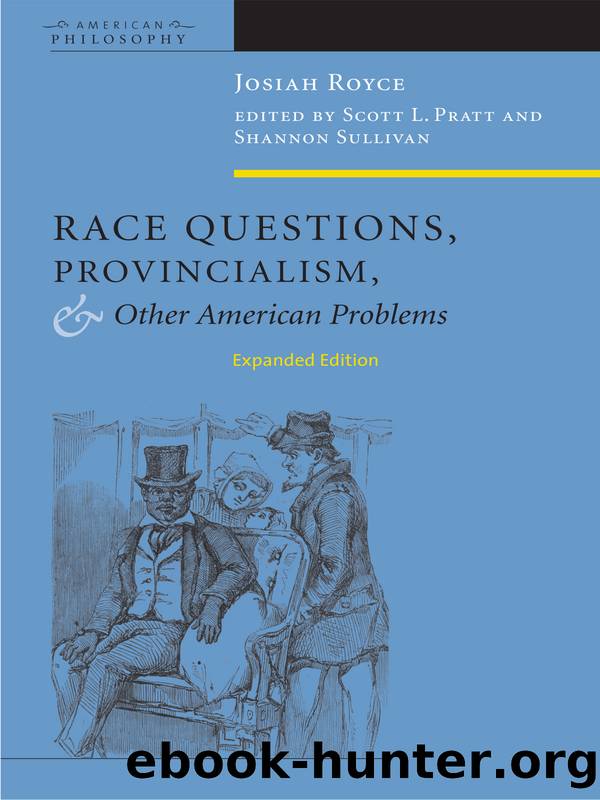Race Questions, Provincialism, and Other American Problems by Royce Josiah;Pratt Scott L.;Sullivan Shannon;

Author:Royce, Josiah;Pratt, Scott L.;Sullivan, Shannon;
Language: eng
Format: epub
Publisher: Fordham University Press
Published: 2009-08-15T00:00:00+00:00
V
SOME RELATIONS OF PHYSICAL TRAINING TO
THE PRESENT PROBLEMS OF MORAL
EDUCATION IN AMERICA
In asking me to address this Society, your Secretary was well aware that I have no right and no desire to pass judgment upon any of the more technical problems which are peculiar to the profession of physical education. But there are problems which are common to your profession and to that region of inquiry to which I am most devoted. These common problems, in fact, interest all who are concerned in the welfare of humanity, and who in particular aim to further the welfare of our country. I refer to those problems of moral education which, in the present time, assume new and difficult forms in American life. I am well aware that those of you, and of your numerous colleagues, who have been most earnest in furthering the cause of physical education, not only in our land, but in Europe, have always laid great stress upon the close relation of sound physical training to good moral training. And we all know how, from primitive times, mankind have used various forms of physical exercise as a
An address before the Boston Physical Education Association [Royceâs note].
part of the discipline which tribes or, later, nations or, in our modern days, civilized men generally, have regarded as fitted to form whatever well-rounded types of individual character the various stages of human culture have admired. Physical training has repeatedly had, in the past, a place in the religious life of various peoples, and systems of secular training have often so much the more followed analogous lines. Chivalry in Europe, Bushido in Japan, were systems of conduct which were inseparable from various plans for physical training. Today most of you lay constant stress upon your function, not only as teachers who care for the health, for the physical growth, and for the accompanying intellectual development of your pupils, but as instructors who contribute what you all believe to be a very significant part of the moral education of the youth of the country. The social organizations known as Young Menâs Christian Associations are the expression of explicitly religious motives, and are unquestionably intended for an ethical purpose. But they regard their gymnasiums as an essential part of their work. And this is but one example of the recognition of a close linkage between physical and moral training,âa linkage which you all believe to be important, and which most of you consciously emphasize in your own practice.
The problems of moral education are common, then, to you and to your colleagues in other branches of education, of inquiry, and of social work. I myself, as a teacher of philosophy, have lately been led to consider some of the problems of ethics with especial reference to the present state of our American civilization. I have supposed, therefore, that you might be interested if I now attempt to state some of these problems in a way to suggest their possible connections with your profession. I make these suggestions very tentatively.
Download
This site does not store any files on its server. We only index and link to content provided by other sites. Please contact the content providers to delete copyright contents if any and email us, we'll remove relevant links or contents immediately.
Cecilia; Or, Memoirs of an Heiress — Volume 1 by Fanny Burney(32547)
Cecilia; Or, Memoirs of an Heiress — Volume 2 by Fanny Burney(31945)
Cecilia; Or, Memoirs of an Heiress — Volume 3 by Fanny Burney(31931)
The Great Music City by Andrea Baker(31917)
We're Going to Need More Wine by Gabrielle Union(19034)
All the Missing Girls by Megan Miranda(15958)
Pimp by Iceberg Slim(14488)
Bombshells: Glamour Girls of a Lifetime by Sullivan Steve(14057)
For the Love of Europe by Rick Steves(13912)
Talking to Strangers by Malcolm Gladwell(13349)
Norse Mythology by Gaiman Neil(13348)
Fifty Shades Freed by E L James(13232)
Mindhunter: Inside the FBI's Elite Serial Crime Unit by John E. Douglas & Mark Olshaker(9324)
Crazy Rich Asians by Kevin Kwan(9277)
The Lost Art of Listening by Michael P. Nichols(7494)
Enlightenment Now: The Case for Reason, Science, Humanism, and Progress by Steven Pinker(7306)
The Four Agreements by Don Miguel Ruiz(6744)
Bad Blood by John Carreyrou(6611)
Weapons of Math Destruction by Cathy O'Neil(6265)
